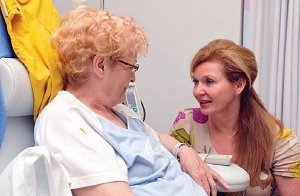Cancer starts in cells in our body, cells are the tiny building blocks that form our organs and tissues in our bodies. Cancer develops when the normal workings of a cell go wrong and the cell keeps dividing making more abnormal cells which form a lump (tumour).
Cancer Services FAQs
 These Cancer FAQs have been compiled in collaboration with our Patient Representative.
These Cancer FAQs have been compiled in collaboration with our Patient Representative.How common is cancer?
Anyone can get cancer, it affects people from all backgrounds and lifestyles. It has been estimated more than one in three people will get cancer at some points in their lives.
Can cancer be prevented?
What are the survival rates?
Cancer survival in the UK has doubled in the last 40 years, 50% of cancer patients survive cancer for 10 or more years. However there is a large variation in survival between cancer types. Once your doctor has all your diagnostic tests they will be able to discuss your case in more individual detail.
Is there a gender difference?
There are many common diseases that are more common in males or females. In cancer, susceptibility is generally higher in males although some cancers are more common in women.
What treatments are available?
- surgery – the cancer is removed in an operation
- radiotherapy - high-energy x-rays are used to destroy cancer cells
- chemotherapy – anti-cancer drugs are used to destroy cancer cells
- Hormonal therapies – treatment changes the hormones in your body, which can slow down or stop cancer from growing
- targeted therapies (sometimes called biological therapies)- treatment interferes with the way cancer cells grow
What are the possible side effects?
Different types of cancer treatment can cause different side effects. Your healthcare team will provide you detailed information about any side effects you may have and how we will try to reduce and manage these.
How does the oncologist/physician decide between chemotherapy and radiotherapy after surgery?
The type of treatment you will have will depend upon the type of cancer and your current health status. Sometimes there are different choices about which treatment you could have and your healthcare team will discuss these options with you. You normally have time to consider what each treatment involves before you decide what is right for you.
What is the difference between chemotherapy and hormonal therapy?
Both treatments are considered to be anti-cancer therapies. Chemotherapy drugs are used to destroy cancer cells and hormonal therapies change the hormones in your body, which can slow down or stop cancer from growing. They can be given individually or used together in combination. Your healthcare team will provide you detailed information your treatment plan and the rationale for the treatment options.
Do you offer financial assistance?
Having cancer can bring extra costs such as travel and sometimes reduced income due to time off work. Our Macmillan Information Manager will be able to assess you for financial support and refer you for further financial guidance if needed.

